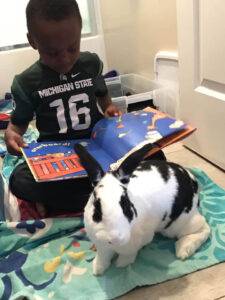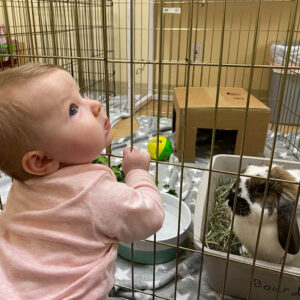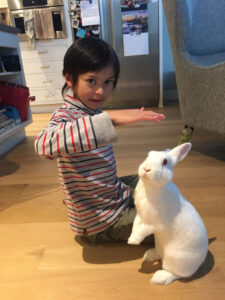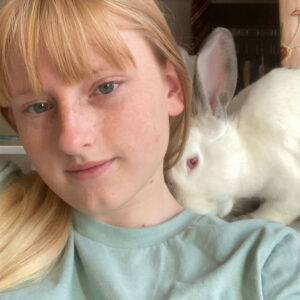When deciding whether a rabbit is right for your family, there are several things to consider.
Long-time Friend Adopting a pet is to commit to providing a forever home. Are you willing to make an over 10-year commitment for a young rabbit? Would an older rabbit be more appropriate?
A pet for the entire family? Does everyone in the family (young and old) want a rabbit? Are they willing to put up with bunny proofing and litterbox training? Are they willing to learn to relate to the rabbit in ways other than by holding the rabbit?
Allergies Does anyone in the family have allergies? A paper in the Journal of Korean Medical Science states that “Although rabbits are common domestic pets, the development of allergic asthma and/or rhinitis attributable to rabbits at home is unusual…” Although some people are indeed allergic to rabbits, it often is the rabbit’s hay, particularly timothy hay, that is the actual allergen. An “finding out” arrangement with a rabbit rescue called foster-to-adopt (caring for a rabbit in one’s home for a time to see if you all are a good combination) is handy for testing if a person is actually allergic to a bunny. Different fur types may make a difference as well.
The Future When adopting, it’s also important to consider, what will your family be like in 5-10 years? Do you plan to move and take bunny with you? Is there a new child or older family member likely to join your residence in your future? Rabbits are more resilient and adaptable than people expect. They adjust well to new baby humans and can make great companions for older family members.
Foster First A “finding out” arrangement with a rabbit rescue called foster-to-adopt (caring for a rabbit in one’s home for a time to see if you all are a good combination) can prevent needing to return a rabbit to the adoption center later.
Got Kids? Please consider that…
While rabbits all have different personalities, in general, many rabbits:
- Usually don’t appreciate being picked up
- Can seem boring to some children–and some adults
- Tend to withdraw or hide if overwhelmed by unwanted attention
- Can take quickly to being litterbox-trained; spaying/neutering helps
- Are fun to watch, interact, and play with–on their terms
- Like to do things by themselves, rather than be made to do something–as in, they’d rather hop where you want them to go instead of being carried or chased there
- Can be shy or outgoing or a mix of the two
- Have strong likes and dislikes–and tend to let you know in uncertain terms which is which
- Are naturally curious and like to check out new things and check in on what you are up to
- Need plenty of indoor, sun-lit exercise space
Can rabbits and children get along? Yes—but there are several things to consider…
 Many people are surprised and then disappointed to learn that rabbits rarely conform to the cute-n-cuddly stereotypes in children’s stories. While rabbits enjoy being stroked, most of them prefer to receive their attention while remaining on the ground or while sitting beside their person. As prey animals, rabbits instinctually feel frightened when picked up. As a result, they can kick and struggle, which can result in hurting themselves or even the child holding them.
Many people are surprised and then disappointed to learn that rabbits rarely conform to the cute-n-cuddly stereotypes in children’s stories. While rabbits enjoy being stroked, most of them prefer to receive their attention while remaining on the ground or while sitting beside their person. As prey animals, rabbits instinctually feel frightened when picked up. As a result, they can kick and struggle, which can result in hurting themselves or even the child holding them.
Most children want a pet they can hold and cuddle. Rabbits need someone who understands they are ground-loving creatures and has the patience to let the rabbit come to them. For these reasons, many children, especially young children, find it a challenge to interact with a rabbit and may lose interest after a few weeks.
A Great Family Pet…for Some
 While rabbits are not an ideal child’s pet, they can make a wonderful family pet–for the right family. An adult needs to be the primary caregiver, the one who is responsible for making certain the rabbit is fed, cared for, played with, and gently loved every day. Following this example, a rabbit can be a terrific part of a child’s life. Also, a family can grow over time. By being shown how, a new people baby can grow into their relationship with the rabbit, along with the rest of their family.
While rabbits are not an ideal child’s pet, they can make a wonderful family pet–for the right family. An adult needs to be the primary caregiver, the one who is responsible for making certain the rabbit is fed, cared for, played with, and gently loved every day. Following this example, a rabbit can be a terrific part of a child’s life. Also, a family can grow over time. By being shown how, a new people baby can grow into their relationship with the rabbit, along with the rest of their family.
On the other hand, the natural exuberance, rambunctiousness, and decibel-level of the average toddler can also be stressful for some rabbits. Bunnies are naturally inclined to either run away or try to bite when approached too quickly and too loudly. A frequently stressed-out rabbit is more prone to develop illnesses.
However even toddlers can be supervised and taught to respect the rabbit and when to approach. For these little kids, teaching them how to pet a rabbit by using the back of the hand is a good way to get around their natural inclination to “pat” or tug the bunny.
Just like Rabbits, Kids Have Different Personalities, Too
 If your child is generally easygoing, calm, gentle, and cooperative, your family may enjoy living with a rabbit. Kids who enjoy learning about animals and love watching how animals act, may have the patience to take the time to build a relationship with the rabbit.
If your child is generally easygoing, calm, gentle, and cooperative, your family may enjoy living with a rabbit. Kids who enjoy learning about animals and love watching how animals act, may have the patience to take the time to build a relationship with the rabbit.
If your child is generally very active, tends to interact physically or aggressively, or frequently needs reminders about rules, they may find it difficult to build a trusting relationship with a rabbit. In those instances, your family may find a rabbit is an additional stress for everyone involved.
Learn about Real Rabbits Before Bringing One Home
 Learning about rabbits before bringing one home can be a fun family activity! Set your child and your future rabbit up for success by showing your child how to interact safely and kindly with a rabbit.
Learning about rabbits before bringing one home can be a fun family activity! Set your child and your future rabbit up for success by showing your child how to interact safely and kindly with a rabbit.
First, pour over this HRS website; get the classic House Rabbit Handbook: How to Live with an Urban Rabbit, Fifth Edition, by HRS founder Marinell Harriman (available online at such shops as BinkyBunny and ThriftBooks). You can also try fostering, as part of your research.
In conclusion…
 Most rabbits do enjoy being with people. With patience, understanding, and an acceptance of individual differences, your family can earn the rabbit’s trust, learn to appreciate your individual rabbit, and enjoy a long time together.
Most rabbits do enjoy being with people. With patience, understanding, and an acceptance of individual differences, your family can earn the rabbit’s trust, learn to appreciate your individual rabbit, and enjoy a long time together.
At House Rabbit Society, we believe rabbits are wonderful companions, but they’re not for everyone.
If you’re new to rabbits, please visit Are you a rabbit person? to learn more about these fascinating, much misunderstood, intelligent, opinionated animals, to help you decide whether they would be a good fit for you, your family, and your lifestyle.
Sign up to Our Newsletter!
Sign up for web update alerts and our monthly e-newsletter
to stay current on HRS, our Chapters, and info for your bunny.



